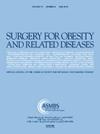减肥手术后食管癌的风险评估:袖式胃切除术和胃分流术的比较队列研究。
IF 3.5
3区 医学
Q1 SURGERY
引用次数: 0
摘要
背景:减肥手术后食管癌的风险是一个有争议的问题。目的:评价袖式胃切除术(SG)和胃旁路术(GB)术后发生食管癌的风险。方法:我们从2007年至2020年期间在法国接受减肥手术的患者的国家出院数据库(Programme De m本文章由计算机程序翻译,如有差异,请以英文原文为准。
Risk assessment for esophageal cancer after bariatric surgery: a comparative cohort study between sleeve gastrectomy and gastric bypass
Background
The risk of esophageal cancer after bariatric surgery is a matter of debate.
Objective
This study aims to evaluate the risk of esophageal cancer following sleeve gastrectomy (SG) and gastric bypass (GB).
Methods
We extracted data from the national discharge database (Programme De Médicalisation des Systèmes d’Information) for patients who underwent bariatric surgery in France between 2007 and 2020. Adult patients undergoing SG or GB were included and followed until December 2022. The primary endpoints were the occurrence of esophageal and gastroesophageal junction (GEJ) cancers. The impact of bariatric procedures on cancer development was assessed using multivariate analysis, along with several sensitivity analyses to validate the findings.
Results
Among the 370,271 patients included, 68.4% underwent SG and 31.6% underwent GB. The median follow-up duration was 7.4 years (interquartile range: 5.3-9.6 years), with approximately 81,000 patients followed for at least 10 years. A total of 96 cases of esophageal cancer were identified: 25 in the GB group and 71 in the SG group. The incidence rates were 2.6 per 100,000 person-years for GB and 3.9 for SG, resulting in an incidence rate ratio of .64 (95% confidence interval [CI]: .40-1.01, P = .055). In multivariate analysis, no significant difference in cancer incidence was found between SG and GB (hazard ratio [HR]: 1.60, 95% CI: .90-2.5, P = .06). Sensitivity analyses further confirmed these findings, showing similar nonsignificant differences across various models.
Conclusion
In this extensive national cohort of bariatric surgery patients, no significant differences were observed in the incidence of esophageal and GEJ cancer between SG and GB.
求助全文
通过发布文献求助,成功后即可免费获取论文全文。
去求助
来源期刊
CiteScore
6.70
自引率
12.90%
发文量
570
审稿时长
56 days
期刊介绍:
Surgery for Obesity and Related Diseases (SOARD), The Official Journal of the American Society for Metabolic and Bariatric Surgery (ASMBS) and the Brazilian Society for Bariatric Surgery, is an international journal devoted to the publication of peer-reviewed manuscripts of the highest quality with objective data regarding techniques for the treatment of severe obesity. Articles document the effects of surgically induced weight loss on obesity physiological, psychiatric and social co-morbidities.

 求助内容:
求助内容: 应助结果提醒方式:
应助结果提醒方式:


